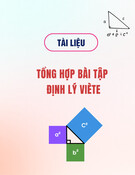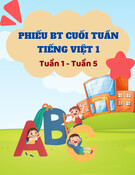
TRƯỜNG THCS MẠO KHÊ II
ĐỀ CƯƠNG ÔN TẬP GIỮA HỌC KÌ II MÔN TIẾNG ANH LỚP 7- NĂM HỌC
2022-2023
A. Vocabulary
- Từ vựng unit 6,7, 8 (lesson 1)
B. Grammar
1. Thì hiện tại đơn ( cách dùng, mẫu câu, từ nhận biết, cách đọc đuôi "s/es"
* have to + V (infinitive) : phải
Note:
(+) S (I/ You/ We/ They/…) + have to + v
(-) S (I/ You/ We/ They/…) + don’t have to + v
(?) Do + S (I/ you/ we/ they/…) + have to + v?
Examples:
I/ You/ We/ They have to study for a test.
I/ You/ We/ They don’t have to write essays.
Do I/ You/ We/ They have to clean the classroom?
(+) S (He/She/It/…) + has to + v
(-) S (He/She/It/…) + doesn’t have to + v
(?) Does + S (he/she/it/…) + have to + v?
Examples:
He/ She has to do homework.
He/ She doesn’t have to pay for the book.
Does he/ she have to give presentations?
2. Thì quá khứ đơn ( Past Simple)
a. Cách dùng:
- Diễn tả một hành động xảy ra trong quá khứ, chấm dứt trong quá khứ không liên quan
đến hiện tại. Thì qkđ diễn tả những hành động mang tính chất kể lại.
b. Từ nhận biết của thì quá khứ đơn.
- yesterday (hôm qua)
- last night/week/month/... (Tối qua/tuần trước/tháng trước..)
- ago (cách đây), (two hours ago: cách đây 2 giờ/ two weeks ago: cách đây 2 ngày...)
- in + thời gian trong quá khứ (e.g: in 1990)
- when: khi (trong câu kể)
c. Mẫu câu:
* Đối với động từ thường
+ Khẳng định
S + v +ed/ v ( bất quy tắc qk)
- Động từ có qui tắc : V-ed
Eg : - work worked
- clean cleaned
* Notes :
- Những động từ một âm tiết, tận cùng là một phụ âm trước nó là một nguyên âm duy
nhất , ta gấp đôi phụ âm cuối rồi thêm đuôi "ed).
Eg : -stop stopped
- drop dropped

- Những động từ kết thúc là "y" trước y là một phụ âm , ta đổi y thành i rồi thêm ed
Eg : - study - studied
- Những động từ kết thúc là nguyên âm + y, biến đổi bình thường.
Eg: - play - played
- Những động từ kết thúc là e chỉ thêm d :
Eg : - arrive arrived
*Cách đọc đuôi ed :
- Đuôi ed được đọc là /id/ khi đứng sau t và d :
Eg : wanted needed
- Đuôi ed được đọc là / t / khi đứng sau F, k, p, sh, ch, ss, x,ce
Eg : - stopped, washed, watched, missed, fixed, cooked ...
- Đuôi ed được đọc là d sau các trường hợp còn lại: lived, played…
+.Phủ định : S + didn't + V
I did not live in Ha Noi
+ Nghi vấn : Did + S + V ?
+ có từ để hỏi: wh + did + s + v…?
* Đối với to be: thì/ là ở
+ Khẳng định
S ( I/ He/she/it) + was….
S ( you/we/they) + were ….
+ phủ định
S ( I/ He/she/it) + was + not
S ( you/we/they) + were + not
+ nghi vấn: was / were + S +…….?
+ câu hỏi có từ để hỏi: wh + was / were + S……..?
3. Thì tương lai đơn
Future simple (Thì tương lai đơn)
a. Usage (Cách dùng)
Cách dùng Ví dụ
Dùng để diễn tả một
hành động hay sự
việc sẽ xảy ra trong
tương lai
- The festival will take place from February 1st to 10th.
(Lễ hội sẽ diễn ra từ ngày mùng 1 đến ngày 10 tháng 2.)
- Our band will play at the festival next month.
(Ban nhạc của chúng tôi sẽ chơi tại lễ hội này tháng tới.)
b. Form (Dạng thức của thì tương lai đơn)
Thể khẳng định Thể phủ định
I/ You/ We/
They/
Danh từ số nhiều + will + V nguyên mẫu
(will = ’ll)
I/ You/ We/
They/
Danh từ số nhiều
+ will not + V
nguyên mẫu
(will not = won’t)
He/ She/ It/
Danh từ số ít
He/ She/ It/
Danh từ số ít
Ví dụ:
- I will visit Hue city.
(Tôi sẽ đến thăm thành phố Huế.)
- She will be fourteen years old on her next
birthday.
(Cô ấy sẽ 14 tuổi vào sinh nhật kế tiếp.)
- They will come to the party next Sunday.
(Chủ nhật tuần sau họ sẽ đến bữa tiệc.)
Ví dụ:
- She won’t forget him.
(Cô ấy sẽ không quên anh ấy.)
- Hung will not go camping next week.
(Tuần tới Hùng sẽ không đi cắm trại.)
- We won’t do some shopping tomorrow.
(Ngày mai chúng tôi sẽ không đi mua
sắm.)

Thể nghi vấn Câu trả lời ngắn
Wil
l
I/ You/ We/
They/
Danh từ số nhiều + V nguyên
mẫu?
Yes,
I/ You/ We/
They/
Danh từ số nhiều
will.
He/ She/ It/
Danh từ số ít No, He/ She/ It/
Danh từ số ít won’t.
Ví dụ:
- Will you go to Hanoi city next month? Yes, I will./ No, I won’t.
(Tháng sau bạn sẽ đi thành phố Hà Nội à?)
- Will she meet her boyfriend tonight? (Tối nay cô ấy sẽ gặp bạn trai phải không?)
Yes, she will./ No, she won’t.
- Will they arrive here next week? (Tuần sau họ sẽ đến đây phải không?)
Yes, they will./ No, they won’t.
Dấu hiệu nhận biết
- Trong câu thì tương lai đơn thường xuất hiện các từ sau: tomorrow (ngày mai);
next week/ month/ year....(tuần/ tháng/ năm sau), some day (một ngày nào đó); soon
(chẳng bao lâu),...
- Ngoài ra các từ và cụm từ như I think, I promise, perhaps = probably (có lẽ, có
thể),... cũng được dùng trong thì tương lai đơn.
4. Liên từ "because" : bởi vì
Ta dùng liên từ because để chỉ nguyên nhân
Because + S + V ( chia)…………………, S + V (chia)…………………………..
S + V (chia)………………………….. because + S + V ( chia)…………………
Eg: Because I stayed up late, I was tired
I was tired because I stayed up late
5. Trạng từ nhấn mạnh : so/ really/ very
- Trạng từ nhấn mạnh thường đứng trước một tính từ để nhấn mạnh
Từ " really" còn đứng trước động từ thường.
Eg: My teacher is really annoyed because I lost my math book.
I really want to buy that computer game.
6. Liên từ " although" mặc dù….nhưng
Although + S + V ( chia)…………………, S + V (chia)…………………………..
S + V (chia)………………………….. although + S + V ( chia)…………………
Eg: Although she was tired, she went to school.
she went to school although she was tired.
7. Adjectives in order (Trật tự của tính từ)
Tính từ kích cỡ + tính từ tuổi + tính từ màu sắc + N (danh từ)
Eg: I have a big new red backpack.
8. Possessive pronouns (Đại từ sở hữu)
Đại từ sở hữu thay thế cho một tính từ sở hữu và một danh từ đã nhắc ở trước. Đại từ sở
hữu luôn đứng một mình không cần danh từ theo sau.
Personal pronouns
(Đại từ nhân xưng)
Possessive adjectives
(Tính từ sở hữu)
Possessive pronouns
(Đại từ sở hữu)
I My Mine
You Your Yours

We Our Ours
They Their Theirs
He His His
She Her Hers
It Its Its
This is her book. That book is mine.
This car is yours.
9 . Comparison of (not) as + adj + as: So sánh (không) bằng
This car is not as expensive as mine.
Trains are as comfortable as cars.
Plane tickets are not as cheap as train tickets.
C. Exercise
I. Choose the words whose underlined part is pronounced differently from that of the
others in each group.
1. A. landmarks B. trains C. winters D. teams
2. A. palaces B. dishes C. performances D. companies
3. A. lucky B. obey C. safety D. eco-friendl
4. A. visited B. travelled C. opened D. happened
6. A. convenient B. eco-friendly C. prevent D. energy
6. A. luggage B. suitcase C. customs D. public
II. Choose the best answer to complete each sentence.
1. I have to__________ my homework tonight.
A. do B. does C. did D. doing
2. I was delighted because my parents__________ me a new car yesterday.
A. buy B. buys C. bought D. buying
3. That exercise was very__________ I couldn’t get an A on my test.
A. interesting B. suitable C. easy D.difficult
4. My son has to__________ hard for the mid-term test.
A. study B. studying C. studied D.studies
5. __________Anna__________ wash her clothes by herself?
A. Does-has to B. Does-have to C. Do-have to D. Do-has to
6. He will__________ do the test tomorrow afternoon.
A. has to B. have C. have to D. has
7. I’m really__________ with Nick. We have an English project, but he doesn’t do his
part.
A. annoyed B. excited C. hopeful D. pleased
8. Mary does not ………….flowers everyday.
A. water B waters C. is watering D.watered
9. We visited Ho Chi Minh city ………………October 4th, 2020.
A. in B. on C. to D. at
10. He wants to buy a__________ suitcase.
A. new large blue B. large new blue C. new blue large D. large new blue
11. Many locals and__________ take the bus to visit the flower garden.
A. tourism B. touring C. tours D. tourists
12. I need to buy a new__________ to prepare for the trip.
A. passport B. cart C. customs D. suitcase
13. Over many years ago, people used to__________ horses to work.

A. drove B. ride C. rode D. drive
14. The local weather forecasts are not always__________.
A. reliable B. countable C. public D. frequent
15. To protect the environment, we should use__________ products.
A. convenient B. eco-friendly C. reliable D. comfortable
16. She is not__________ intelligent__________ her sister.
A. as-as B. more-as C. as-than D. same-as
17. This is not your luggage. It's__________.
A. herself B. her C. she D. hers
18 The government encourages people to use more public__________ to save energy.
A. ticket B. transportation C. streetcar D. luggage
19. I usually walk to school, but today I__________ to school by bus.
A. am going B. goes C. go D. went
III . Circle the letter A, B, C or D to indicate the underlined part that needs
correcting in each of the following questions.
1. She will goes to the sports center to play football tomorrow.
A B C D
2. We weren't play badminton at the sports center 10 days ago..
A B C D
3. This is my house and that is their.
A B C D
IV. Supply the correct forms of the given words to complete the sentences.
1. My country attracts a lot of ____________ every year. (visit )
2. Using eco- __________ transports is the best way to protect environment. (friend)
3. We are giving a ___________next week. (present)
4. The action movie was so ________________ that he felt asleep. ( bore)
V. READING
Read the following passage and decide whether each of the statements 1-5 is TRUE or
FALSE.
Last summer holiday Linh’s family went back to the UK and they went to a music
festival on the Isle of Wight. It is one of the most famous music festivals in the country,
which takes place every June. When they got there, Linh was impressed by the huge
number of people. About sixty thousand people went to the event. They did not stay at a
hotel but put up a tent in the camp site. It was lots of fun. They met Jon Bon Jovi! He is
her father ‘s favorite singer. He and his friends stirred up the crowd in nearly three hours
with the hit songs.
True False
1. Last summer holiday Linh’s family went back to the USA
2. The festival takes place every June.
3. Linh was impressed by many people
4. Linh's fanther does not like Bon Jovi
5. The people coming to the festival stay in hotels
VI. Rewrite the following sentences without changing the meaning.
1. She is more beautiful than me.



![Tài liệu tham khảo Tiếng Anh lớp 8 [mới nhất/hay nhất/chuẩn nhất]](https://cdn.tailieu.vn/images/document/thumbnail/2025/20250806/anhvan.knndl.htc@gmail.com/135x160/54311754535084.jpg)










![Phiếu bài tập cuối tuần Tiếng Việt 1 tuần 2 đề 2: [Hướng dẫn chi tiết]](https://cdn.tailieu.vn/images/document/thumbnail/2025/20250728/thanhha01/135x160/42951755577464.jpg)

